When Is a Continental Giant Rabbit the Right Choice for You?
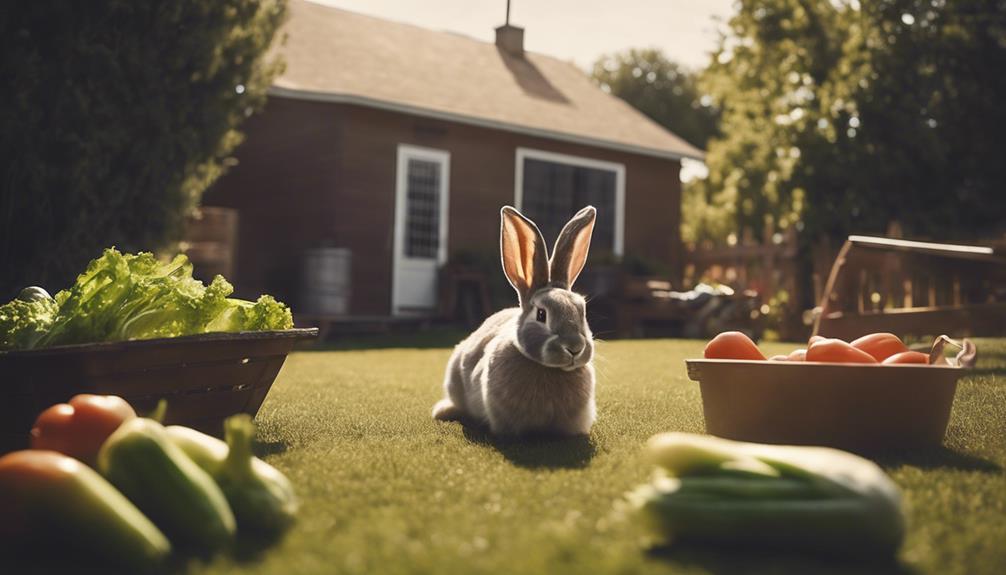
If you are considering bringing a Continental Giant Rabbit into your home, it's important to understand the commitment and responsibilities that come with owning such a large and unique pet.
These rabbits can weigh up to 20 pounds and require a significant amount of space to roam and exercise. They also need a spacious enclosure, a proper diet, regular veterinary care, and plenty of social interaction.
Before deciding to adopt a Continental Giant Rabbit, make sure you have the time, resources, and dedication to provide for all of their needs. These gentle giants can make wonderful pets, but they require a high level of care and attention to thrive in a domestic setting.
Breed Characteristics and Temperament
Continental Giant rabbits, the largest rabbit breed, exhibit a docile and friendly temperament that makes them ideal companions for families. Known for their gentle nature, these rabbits are perfect for households seeking a sociable pet. Their size, ranging from 15-23 pounds, is comparable to some small dog breeds, adding to their appeal. Despite their large stature, Continental Giants are affectionate and enjoy human interaction, making them great for families with children.
In addition to their friendly demeanor, Continental Giant rabbits are intelligent and trainable. They respond well to positive reinforcement training methods, allowing owners to teach them various commands and behaviors. However, due to their size, these rabbits require attentive care to ensure their well-being and prevent potential health concerns. With a lifespan of 5-7 years, providing a loving and nurturing environment is crucial for the overall health and happiness of these charming companions.
Cost of Ownership and Care Requirements
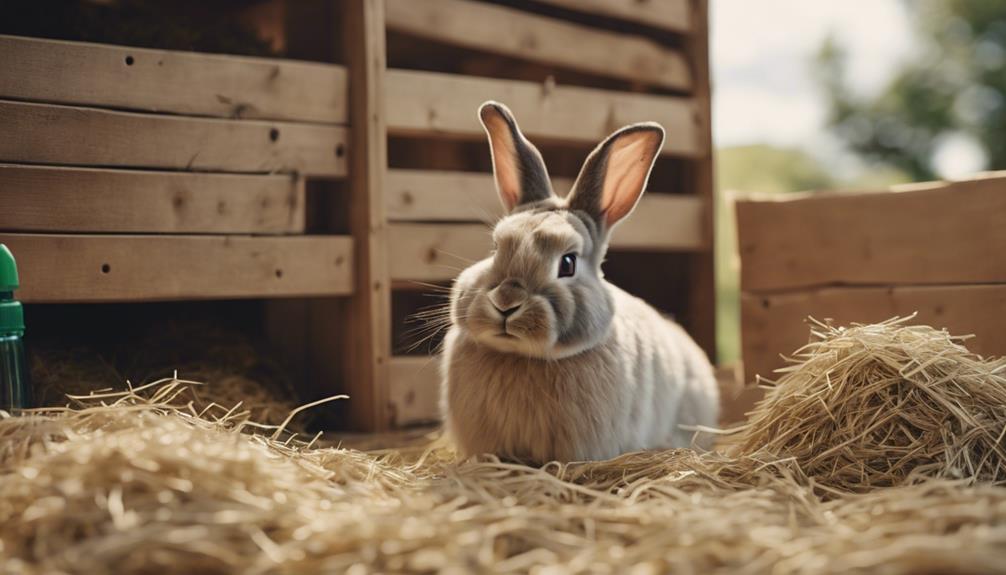
When considering the cost of ownership and care requirements for a Continental Giant Rabbit, potential owners should be prepared for initial expenses ranging from $650 to $1,500 along with ongoing monthly costs for food and maintenance. In addition to the initial investment, owners need to consider the monthly expenses for high-quality food, bedding, and veterinary care.
These rabbits require a spacious living area to move around comfortably, a large crate with soft bedding for rest, and proper potty training to maintain cleanliness. Due to their chewing habits, rabbit-proofing the living space is crucial to prevent accidents. Grooming is essential for their dense fur to prevent matting and maintain overall health.
Meeting their nutritional needs with a balanced diet of hay, pellets, and vegetables in appropriate serving sizes is vital to prevent obesity and maintain their well-being. Potential owners should assess their ability to meet these care requirements, allocate sufficient space, and commit to providing the necessary grooming and nutritional care before deciding to welcome a Continental Giant Rabbit into their home.
Compatibility With Children and Other Pets
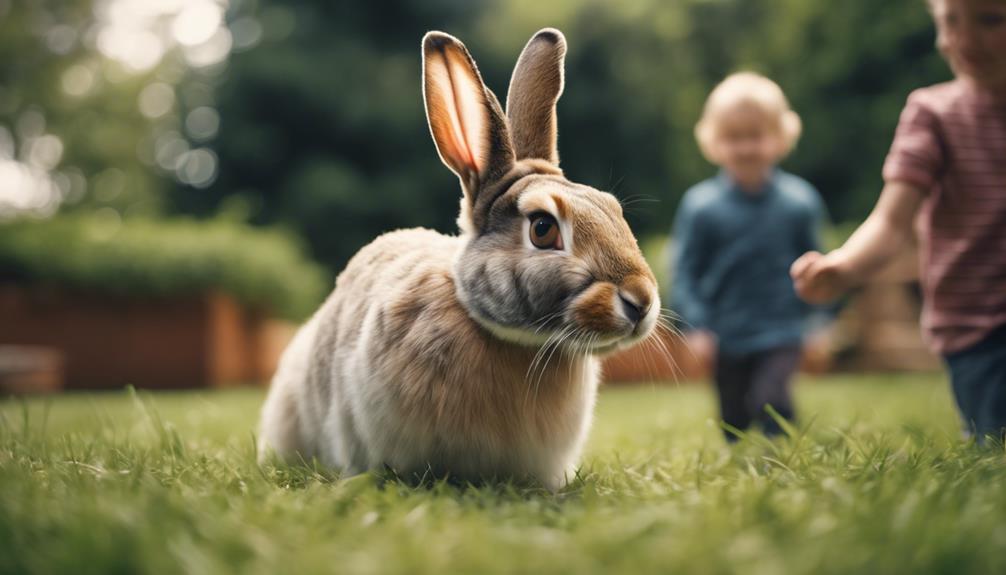
Continental Giant Rabbits can make wonderful companions for children when supervised due to their gentle demeanor and large size.
It's crucial to ensure safety and prevent accidental injuries by closely monitoring interactions between the rabbit and children.
Introducing the rabbit gradually to children and other pets can help establish positive relationships and create a harmonious environment in the household.
Pet Interaction Dynamics
Supervised interactions play a crucial role in ensuring the safe and proper handling of Continental Giant Rabbits, especially when considering their compatibility with children and other pets. These gentle and affectionate rabbits can make great companions for kids when interactions are monitored. Introducing them slowly to other pets allows for a better understanding of their compatibility and helps prevent conflicts.
With adequate socialization, Continental Giants can form strong bonds with cats, dogs, and other rabbits. It's essential to monitor the interactions closely and provide a safe environment to nurture positive relationships between the rabbits and other pets. By taking these precautions, owners can help facilitate harmonious dynamics between their Continental Giant and other household animals.
Child Safety Considerations
Considering the compatibility of Continental Giant Rabbits with children and other pets involves understanding their gentle nature and specific care requirements for safe interactions.
When it comes to child safety considerations:
- Supervision: Always supervise interactions between children and Continental Giant Rabbits due to the rabbit's large size and fragility.
- Teaching Respect: Teach children to interact respectfully with the rabbit to prevent accidental harm or stress.
- Introducing Pets: Introduce rabbits to other pets slowly and monitor their interactions to ensure compatibility and a harmonious environment.
Health and Nutrition Needs
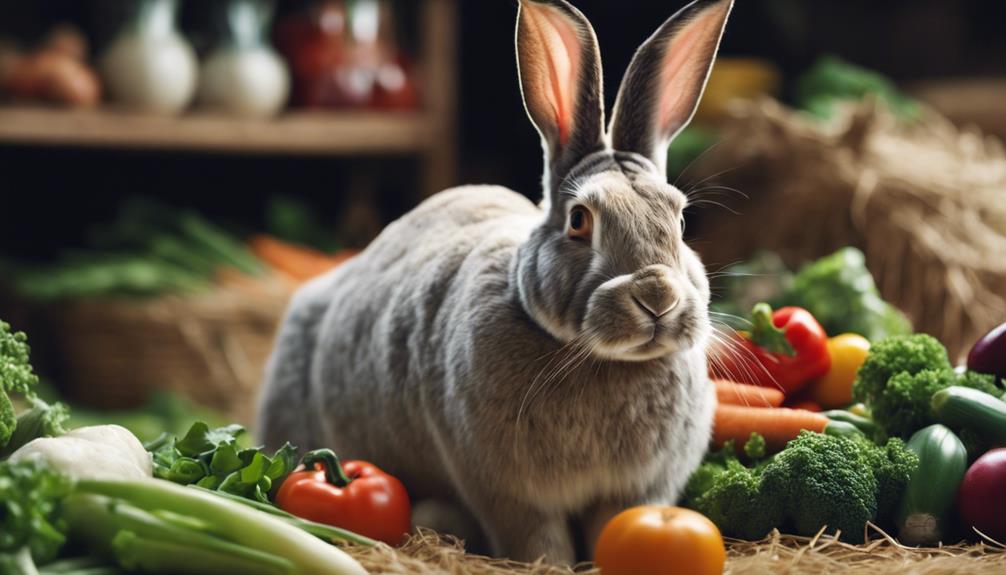
Continental Giant rabbits require a well-rounded diet comprising pellets, hay, and vegetables to maintain their health. Regular weight monitoring is crucial to prevent obesity-related health issues.
Dental care, including chew toys and ample hay for dental health and digestion, is vital for their overall well-being.
Dietary Requirements Overview
High-quality pellets, fresh hay, and fibrous vegetables form the foundation of a Continental Giant rabbit's dietary requirements to ensure optimal health and nutrition.
- Hay: Essential for dental health and proper digestion.
- Sweet Fruits: Avoid feeding regularly to prevent obesity.
- Serving Sizes: Monitor to prevent overfeeding.
For Continental Giant rabbits, a well-balanced diet is crucial. Pellets, hay, and vegetables should be provided in appropriate amounts to prevent health issues related to overfeeding. By adhering to these dietary guidelines, owners can help maintain the overall well-being and longevity of their Continental Giant rabbits.
Common Health Concerns
When caring for Continental Giant Rabbits, owners must be vigilant in addressing common health concerns related to their specific health and nutrition needs. These rabbits are prone to health issues such as sore hocks, dental problems, obesity, GI stasis, and arthritis. To ensure their well-being, a balanced diet including hay, high-quality pellets, and fibrous vegetables is essential. Regular monitoring of weight, dental health, and behavior is crucial. Proper grooming, dental check-ups, and a balanced diet are vital components of their care. Being aware of these common health concerns and nutritional requirements is key to ensuring the longevity and quality of life for Continental Giant Rabbits.
| Health Concerns | Description |
|---|---|
| Sore Hocks | Painful sores on the rabbit's hocks due to pressure |
| Dental Problems | Common issue requiring proper dental care and diet |
| Obesity | Risk from overfeeding, necessitates a balanced diet |
| GI Stasis | Gastrointestinal issue requiring immediate attention |
Breeding Considerations and Tips
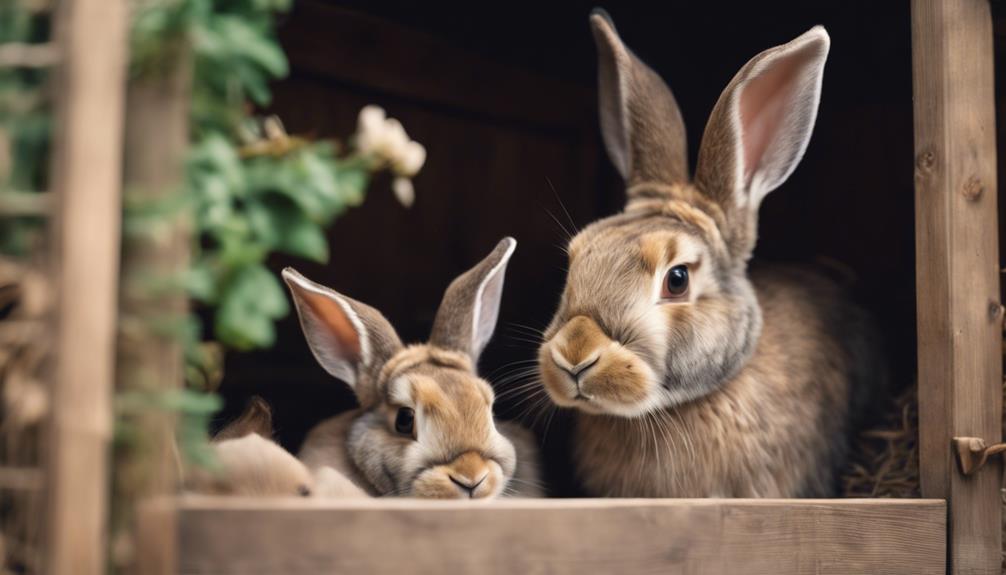
Breeding Continental Giant rabbits requires careful consideration of factors such as age, weight, and optimal breeding months for successful reproduction. To ensure a successful breeding program, here are some essential tips to keep in mind:
- Healthy Rabbits: Breeding should involve healthy rabbits aged 8-9 months and weighing at least 13 pounds.
- Proper Environment: Provide proper lighting, separate housing for bucks and does, and monitor their weight regularly to ensure optimal breeding conditions.
- Quality Practices: Pairing rabbits of like colors, maintaining breeding standards, and following quality practices can enhance breeding success.
It is crucial to seek veterinary care for any breeding-related issues, monitor the behavior of the rabbits closely, and be prepared for the delivery period lasting around 28-31 days.
Housing and Exercise Requirements
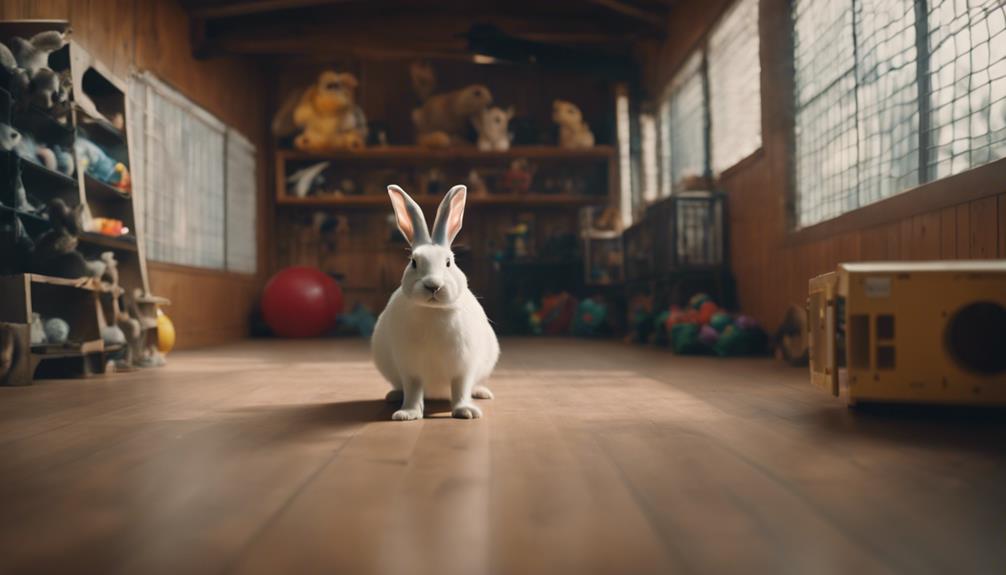
Ensuring adequate housing and exercise for Continental Giant rabbits is essential to support their well-being and happiness. These large rabbits require a living space that's 3-4 times their length to accommodate their size. Additionally, they need extra room for daily exercise to maintain their health and contentment.
Creating a habitat for a Continental Giant rabbit can involve linking multiple pet exercise pens together to provide ample space. Free-roaming options can also be beneficial, allowing these rabbits the opportunity to explore and exercise freely. Regular exercise is crucial for their overall well-being, as it not only promotes physical health but also provides mental stimulation.
Making the Decision: Is It Right for You?
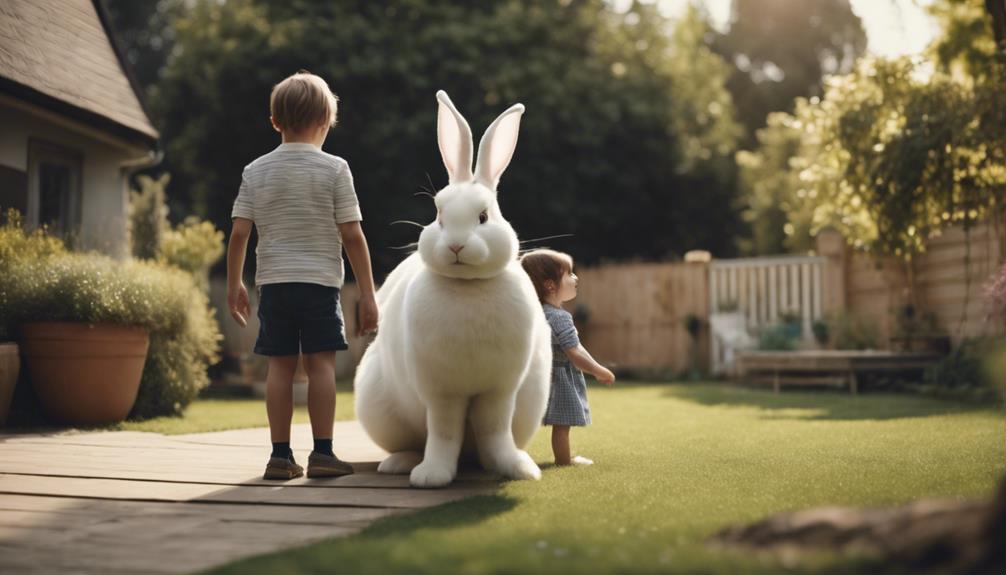
To determine if owning a Continental Giant rabbit is the right choice for you, carefully evaluate your experience level, available space, grooming commitment, financial readiness, and the time needed for training and handling a large breed.
When considering whether a Continental Giant is suitable for you, keep in mind the following:
- Experience Level: Continentals are best suited for experienced rabbit owners due to their size and specific care requirements.
- Space: Ensure you have ample space for a large rabbit to exercise and move around comfortably.
- Grooming and Health Needs: Be prepared for regular grooming and attentive care to meet the health needs of a Continental Giant.
Before deciding to bring a Continental Giant into your home, think about the potential costs involved, including initial purchase price, monthly expenses, and veterinary care. Additionally, consider the commitment required for potty training and handling such a large breed.
Frequently Asked Questions
What Is the Personality of a Continental Giant Rabbit?
Continental Giant rabbits possess a personality that combines playful antics, gentle nature, and curious exploration. They make loyal companions, showcasing intelligent interactions, social engagement, and bonding activities. Their emotional connections, communication skills, and trust-building abilities enrich the human-rabbit relationship.
Are Continental Giant Rabbits Friendly?
Continental Giant rabbits are known for their friendly demeanor. They respond well to human interaction, enjoying cuddling and bonding easily. With proper socialization and behavior training, these rabbits can develop strong relationships with humans and other pets.
What Is the Friendliest Giant Rabbit?
The friendliest giant rabbit breed is the Continental Giant. Known for their docile nature and loving demeanor, they are highly trainable and make excellent companions for interactive play. They are popular for their affectionate behavior in shows.
Can You Keep a Giant Rabbit as a Pet?
Keeping a giant rabbit as a pet requires understanding their care needs. Size considerations, exercise requirements, diet, housing, bonding, health, grooming, training, and socialization are crucial. Providing ample space, attention, and commitment is essential for their well-being.









